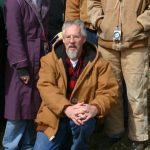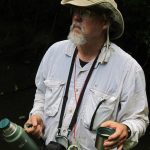By: Kelsea Hall
Dr. Cary Chevalier is reaching beyond textbooks and lectures to educate his students by using hands on experience in the field of wildlife conservation and management.
Chevalier was hired at Western in 1996 to help launch the Conservation and Wildlife Management degree program. Western’s program is only one of two programs in Missouri to offer all of the required courses for certification as a wildlife biologist by The Wildlife Society.
Chevalier uses his skills to challenge students to seek field experience with Western’s award-winning student chapter of The Wildlife Society, an organization he advises.
Field experience can involve setting and checking animal traps, collecting fecal samples or surveying animal populations; Chevalier and his students are not afraid to get their hands dirty in order to build professional, well-rounded résumés. He earned national awards for his successful advisement and involvement with the organization.
“Don’t think for a second that you are going to get a job just because you have a degree–you have to have the foundation of your academic background, but you also have to get involved in what my students call, ‘the trilogy of success,’” Chevalier said.
For Chevalier and his students, the trilogy of success involves three key components: professional development, leadership development and skill-set development. The Wildlife Society adheres to all three components through research projects, working closely with the conservation department and other forms of field work.
However, field work is difficult for students with physical disabilities, so Chevalier puts a tremendous amount of effort to make sure each student obtains equal opportunities.
Bridgette French-Harbison, a graduate student at Western, uses a wheelchair after suffering from a stroke, making it difficult for her to physically join other students at Western during field work for research projects.
When her research group was checking animal traps and trekking across difficult terrain, a task nearly impossible or French-Harbison to perform, Chevalier borrowed a John Deere Gator so she could navigate through the forests. Chevalier wanted her to have the same hands-on authentic experience as the other students.
“Dr. C has always made the extra effort to include me in as much of the fieldwork as possible. He gets a gator or requests that a track wheelchair be brought to campus so I can go out into the forest and participate just like anyone else,” French-Harbison said. “His efforts to allow me to participate in fieldwork helped me gain the confidence I needed to pursue a Ph.D. in science.”
Chevalier believes that professors should reach out to students in need to give them bountiful opportunities and experiences, which is why he provided the necessary equipment for French-Harbison.
“For me, it was a growing experience to be able to work with someone who had a physical challenge like that, and I think I learned more from her,” Chevalier said.
Chevalier’s efforts impact multiple students at Western. Caitlyn Glore, a wildlife conservation and management major, said that Chevalier focuses on educating students by relating academics to real-life situations.
“He genuinely cares about his students, and helps us get professionally prepared for jobs,” Glore said.
Chevalier prepares students by getting involved with community conservation efforts such as quail and deer surveys. The conservation department often relies on Western’s student chapter of The WIldlife Society for research projects and data collection.
Jackie Herron, a student from The Wildlife Society, said she appreciates Chevalier’s dedication to teaching. According to Herron, Chevalier invites wildlife professionals from his personal network to teach seminars and discuss employment opportunities.
“He’s giving us outside connections with future jobs, so in a way, it’s motivation to get us through our college career,” Herron said.
Chevalier also hosts a chainsaw workshop to teach students how to properly and safely use the equipment. He is proud of the fact that the conservation department trusts his students enough to give them more responsibilities than most student organizations.
Chevalier’s favorite part of his job is watching the transformation his students undergo from the first time they enter his office to the moment they put on their graduation caps to earn their degrees.
“Dreams do not become a reality without hard work, and when you succeed, that taste of victory is sweeter than honey,” Chevalier said.



